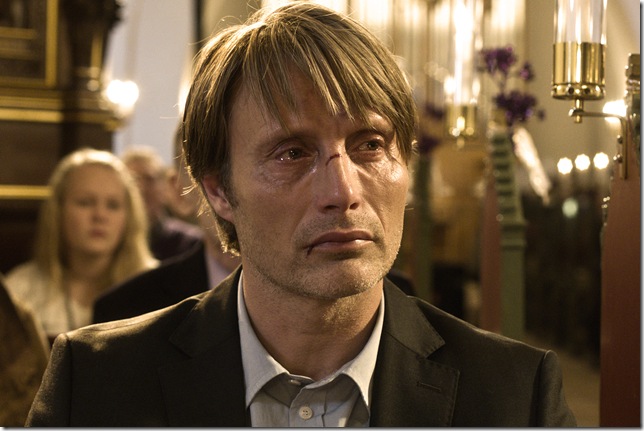Lucas, the protagonist of Thomas Vinterberg’s The Hunt, is fond of horsing around. In the film’s opening scene, which looks like something out of the Grown-Ups movies, Lucas (Mads Mikkelsen) and his coterie of male colleagues gather around a dock and strip down to their undies, placing bets on whether one of their pack will jump naked into the freezing November water of the local pond. He does, to the ballyhoo of the clan.
A few scenes later, we see Lucas similarly interacting with the kindergarten-age students of the local school where he teaches, in a job that is perhaps below his skill set but that he apparently relishes. He rustles young boys to the ground playfully, and they reciprocate. He helps them wipe their behinds after they use the toilet, if necessary. And he helps his best friend’s young daughter, Klara, walk to school and back when her parents are too overwhelmed.
There’s nothing untoward about Lucas’ innocent physicality, but that doesn’t stop Klara, in a fit of pre-pubescent jealousy, conflation and fantasy, to level a vague allegation of sexual abuse against Lucas, in a tense and stomach-churning conversation with the school’s administrator, Grethe (Susse Wold). It’s stomach-churning not because it’s true but because it’s false, and because we all know the repercussions of such a charge.
The Hunt is not trying to be the Scandinavian Doubt, whose effectiveness derived from a scandalous, did-he-or-didn’t-he mystery. In this case, there is never a question, to us anyway, of Lucas’ innocence: Vinterberg is more interested in charting the aftermath of Klara’s flippant allegation and the super-storm of controversy it creates in the life of one man and the provincial town he inhabits.
Grethe starts by summoning a therapist, who asks a number of patently leading questions to a lockjawed Klara, who, in her confused state, can only muster the occasional nod. The psychologist takes this as a clear affirmation of abuse. The authorities are summoned. Rumors spread like termites on a battered armoire. When Klara tries to tell her mother that she made the whole thing up, her mom dismisses the admission, telling her daughter what really happened in the patronizing way parents condescend to children.
Suddenly, the locals believe there to be “overwhelming” evidence of Lucas’ guilt, despite what is actually an absence of evidence. Grethe corrals a PTA meeting, where she alludes to the high probability of a multitude of victims; if any of the neighborhood children exhibit such “abuse indicators” as nightmares and bed-wetting, they are believed to have been molested by Lucas as well. Sure enough, Lucas’ life spirals into abject banishment. He becomes a pariah, shunned in a coordinated character assassination, one that affects his friends, his beloved son from a broken marriage, his exotic new girlfriend, even his dog, in a domino of events that could drive anyone to savagery.
The Hunt is imperfect, partly because Vinterberg never fulfills the symbolic potential of Lucas as both a hunter (of big game) and the hunted (by his community, as an accused abuser). Obvious and half-baked, the hunting allegory feels inserted late, like a portentous afterthought, and it contributes little to the film’s central narrative.
But this is still a fine example of a classic wrong-man moral drama, one that inverts our collective preconceptions with sensitivity and complexity. Most films about the subject of child sex abuse — like The Woodsman and Little Children — deal with clearly defined abusers. Generally, we’re predisposed to believe our children when they make these accusations, and there is no crime more vile and repugnant than the sexual abuse of a minor.
There’s a reason even murderers and rapists find these perpetrators the scum of the earth. It’s completely plausible that a scenario just like the one dramatized in The Hunt would play out in real life; the difference is that in our world, Lucas’ prosecution would be tried on the air 24 hours a day on HLN, without a counterpoint.
Even writing these words, it’s hard to not feel my blood pressure boiling. This is an infuriating indictment of rushing to judgment, and an acknowledgment of the fallacy that the words of an innocent child are always sacrosanct. But most of all, it shows that in the court of public opinion, there’s no such thing as presumption of innocence.
THE HUNT. Director: Thomas Vinterberg; Cast: Mads Mikkelsen, Thomas Bo Larsen, Annika Wedderkopp, Lasse Fogelstrom, Susse Wold, Alexandra Rapaport; Rating: R; in Danish with English subtitles; Now playing at Movies of Delray, Movies of Lake Worth, Living Room Theaters at FAU, and the Miami Beach Cinematheque.
